Tags
There you see her
Sitting there across the way
She don’t got a lot to say
But there’s something about her
And you don’t know why
But you’re dying to try
You wanna kiss girl
—Howard Ashman, “Kiss the Girl”
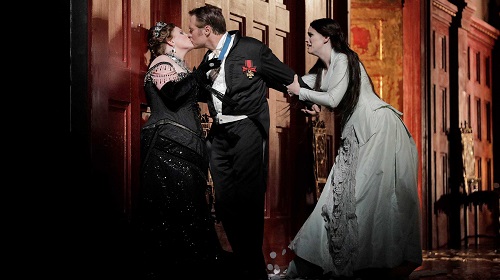
The Prince tries to have his cake and eat it too and gets his just deserts in Rusalka. Photo by Cory Weaver.
Antonín Dvořák, Rusalka (1901)
Based on: the fairy tales of Karel Jaromír Erben and Božena Němcová
Setting: Once upon a time in the land of nymphs and goblins
Plot in 101 words or less: Water nymph Rusalka moons about a Prince who moons around her lake. Her father warns that water and earth signs are ultimately incompatible but sends her to witch Ježibaba anyway. Mixed messages, dad! Ježibaba says no take-backsies on her potions but Rusalka is like cool, cool, cool, hit me. And we’re off to the castle for below-stairs gossiping! The fickle Prince likes Rusalka okay but quickly ditches her for some rando Foreign Princess, screaming, “I’ll vote for a woman, just not that woman!” He lives to regret this but only long enough to get the kiss of death from now-will-o’-the-wisp Rusalka.
Sung in: Czech
Memorable Music: “Měsíčku na nebi hlubokém” (“Song to the Moon”)
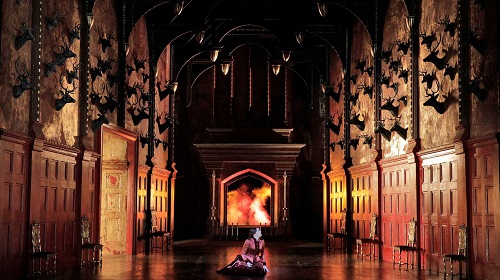
Do you think the Prince is a hunter? The darkly predatory ballroom in Rusalka. Photo by Cory Weaver.
Upon leaving the first performance of Rusalka that I attended at San Francisco Opera on June 25, I immediately thought to myself, “When does the box office open tomorrow? Because I need to see this again.” Yes, folks, it was that good. Luckily, because I hadn’t yet used either of my subscription upgrades and I was going solo, I was able to score a premium orchestra seat on the closing night for next to nothing. I also bought a second balcony ticket for Orlando because why not? I’m starting to see multiple productions in a run. What is this world coming to?
My love for Rusalka is somewhat odd because, frankly, the libretto is sort of a mess. Things don’t really make a lot of sense. Why does becoming human mean she loses her voice? What’s in it for Ježibaba exactly? Where and why does the “white doe” come in to things? Where does this foreign princess come from? (She is not the witch in disguise as in the Disney version.) Why does the princess spin on a dime and curse the prince? Why does the prince suddenly become “sick”? (Hmm, maybe the princess is supposed to be the witch.) I know it’s opera, but there are limits.
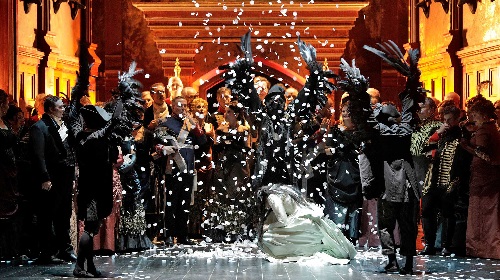
What is going on here? Who the hell knows? But it was beautiful to watch and listen to. Photo by Cory Weaver.
In any case, plot holes and loose ends aside, this production was stunning (Production: David McVicar). A real foresty-looking forest. A gorgeous ballroom. A workhorse of a kitchen. Lovely foreground and background elements (Set Designer: John Macfarlane). Exquisite costumes (Costume Designer: Moritz Junge). Beautiful music, with a superb conductor at the podium in Eun Sun Kim, who was making her San Francisco debut. [Side note: More of her in future seasons, please.] Even the bit of ballet in the castle scene was well done and integrated into the whole—something I find is not often true at San Francisco Opera (Choreographer: Andrew George).
And the singing, my god, the singing.
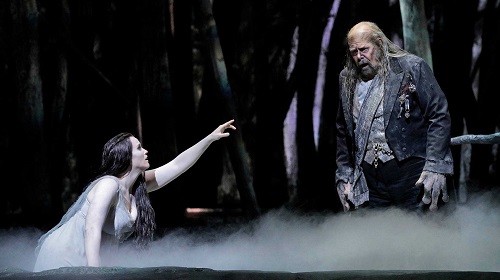
Rachel Willis-Sørensen as Rusalka and Kristinn Sigmundsson as her father Vodník in Rusalka. Photo by Cory Weaver.
Soprano Rachel Willis-Sørensen (last seen in Die Meistersinger von Nürnberg) as Rusalka was a picture of frustrated love and emotional torment, though I sometimes found her movements a bit peculiar. Bass Kristinn Sigmundsson, who I loved in Der fliegende Holländer (The Flying Dutchman) seemed perfectly cast as water goblin Vodník, a grim but ultimately loving father. A highlight of the first act was mezzo-soprano Jamie Barton’s turn as Ježibaba, the witch. After being somewhat overshadowed by Sondra Radvanovsky in Roberto Devereux, it was nice to see her steal the show here.
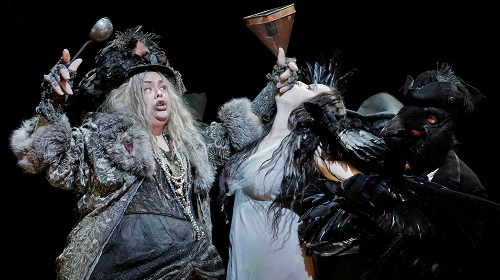
Jamie Barton as Ježibaba administers her potion to Rachel Willis-Sørensen in Rusalka. Photo by Cory Weaver.
At the castle, tenor Brandon Jovanovich, who I love more and more each opera (Remember him from Susannah?), sang and acted beautifully to express the twists and turns of the crazy plot and the fickle nature of his Prince. In this he was aided and abetted by Sarah Cambidge’s all too brief appearance as the dastardly and world-wise Foreign Princess. And shout out to Laura Krumm, who played the Kitchen Boy with real flair.
Finally, the cavorting of the wood nymphs, led by Adler Fellows Natalie Image, Simone McIntosh, and Ashley Dixon was raucous, fun, and just a little bit sinister.
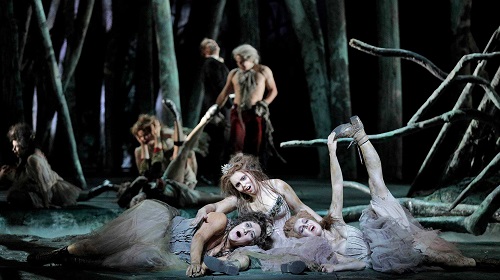
Adler Fellows Ashley Dixon, Natalie Image, and Simone McIntosh as raucous wood nymphs. Photo by Cory Weaver.
Truly, it was the dark fairy tale you imagine (and hope for) behind the Disney version.
